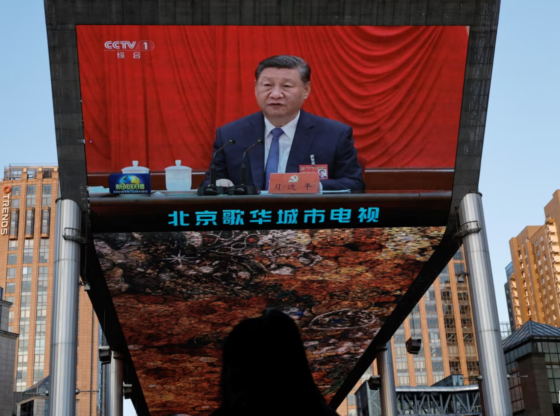TAIPEI- After the Third Plenary Session of the 20th CPC Central Committee closed, the CPC’s top leaders held a press conference on Friday (July 19) and said that the plenary session had proposed more than 300 “important reform measures” and that although it faced many “complex contradictions and problems”, it would continue to expand its opening up to the outside world. In this regard, analysts said that the CPC’s propaganda was inconsistent with the actual trend, and the communiqué of the Third Plenary Session once again showed that China was moving towards a development direction of “security first” rather than “economy first”.
After the release of the communique of the Third Plenary Session of the 18th CPC Central Committee, there was widespread disappointment from all walks of life, but the CPC leadership did not forget to speak out again.
Han Wenxiu, deputy director of the CPC Central Committee’s Financial and Economic Affairs Office, said at a press conference titled “Interpreting the Spirit of the Third Plenary Session of the 18th CPC Central Committee” on Friday that China is a “big economy” with great potential for domestic demand and internal circulation. As long as we do our own things well, we can ensure the smooth circulation of the national economy.
He said that China is still a fertile ground for investment from all countries, and the withdrawal of foreign capital from China is only a “temporary phenomenon”. China will further relax market access and effectively protect the legitimate rights and interests of foreign companies.
Officials attending the press conference also revealed that the “Decision on Comprehensively Deepening Reforms and Promoting Chinese-style Modernization” adopted by the plenary session was personally headed by General Secretary of the CPC Xi Jinping as the head of the document drafting group, “planning and organizing research throughout the process.”
According to reports, the “Decision” is divided into 15 parts and 60 articles, with three major sections: general discussion, economic system reform, and strengthening the party’s leadership over reform, and a total of more than 300 “important reform measures” are proposed.
The Third Plenary Session of the 20th CPC Central Committee closed on Thursday (July 18) and issued a communiqué setting the direction of “comprehensively deepening reform and promoting Chinese-style modernization”. In this regard, analysts generally believe that the content of this communiqué is empty and repetitive, and it does not propose any specific countermeasures to China’s current economic difficulties, which may mean that the era of China’s economic reform has come to an end.
China’s economic outlook will focus on “risk hedging” both internally and externally
. However, despite the CCP’s repeated praise, it is still difficult to boost confidence in China’s economy.
Guo Yuren, deputy director of the National Policy Research Institute in Taipei, said that from the communiqué of the Third Plenary Session of the 18th CPC Central Committee to the press release after the meeting, the CCP’s current focus is on “risk hedging” both internally and externally.
He said that China’s economy is facing crises such as local debt internally, and boycotted by Europe and the United States externally. The “new three” electric vehicles, lithium batteries and solar photovoltaic industries that drive the economy are generally targeted and sanctioned by Western powers, and foreign direct investment in China fell sharply by more than 80% last year.
Even former US President Donald Trump, who is optimistic about the election, has repeatedly threatened that he will impose high tariffs on China after his election, and even cancel China’s most-favored-nation treatment.
Guo Yuren believes that the Chinese government claims to expand opening up, but is constantly moving towards controlling the economy. The more than 300 measures introduced after the Third Plenary Session of the 18th CPC Central Committee may tighten supervision in the financial and economic fields.
Guo Yuren told VOA: “The CPC Central Committee is reviewing all internal and external risks in the future, so it has introduced so many measures. (The purpose is) to more strictly control and avoid serious disorder in the internal economy or finance.”
Scholars: China’s market reform is full of contradictory statements
The Center for International Relations Research at National Chengchi University in Taiwan also held a symposium on Friday morning to analyze the Third Plenary Session of the 18th CPC Central Committee. The scholars attending the symposium also generally believed that the Third Plenary Session of the 18th CPC Central Committee’s communiqué on reform is contradictory, especially the CCP’s deployment of “security” may take precedence over economic development, and it also proposed a timetable for completing reforms in 2029, which shows that Xi Jinping attaches more importance to top-level design and comprehensive governance than the market economy.
Chen Desheng, a researcher at the Center for International Relations at National Chengchi University in Taiwan, said that the Third Plenary Session of the 18th CPC Central Committee’s communiqué is full of “positively speaking in a negative way” statements, distorting the concepts of reform and open markets. It wants to deepen reforms while adhering to Marxism, which is full of contradictions.
Chen Desheng said at the forum: “His (Xi Jinping’s) reform and opening up and the centralization of market concepts, as well as the operation of political dogma over the market, will have a kind of interference and negative effect on market-oriented reforms. Therefore, I am not optimistic about the economic growth of mainland China.”
Zhang Wuyue, director of the Cross-Strait Relations Center of Tamkang University, said at the forum that the number of times the communiqué mentioned keywords such as market and economy reached a record low, but the number of times it emphasized “security” was the highest. It can be seen that the CCP now holds high the security strategic deployment, rather than the past focus on peace and economic development.
Liu Mengjun, researcher and director of the First Research Institute of the Chinese Institute for Economic Research, said that the communiqué set the tone of “comprehensive deepening of reform”, high-quality development and innovative industrial upgrading, but did not touch on how China will respond to the dilemma of the middle-income trap or the long-term economic slowdown. He said that before 2032, a large amount of debts of Chinese real estate companies, local governments and small and medium-sized enterprises will mature, which may increase the risk of bad debts in the banking and financial system. This is a trend that the international community should pay attention to.
Zeng Weifeng, assistant researcher at the National Chengchi University’s Center for International Relations, analyzed that this communiqué focused on “major establishment” rather than major destruction, and emphasized “Xi-style reform”, which highlights that Xi Jinping’s development direction will be “weaker markets, tighter supervision and safety first.”
Kou Jianwen: “Reformer Xi Jinping” feature article may become “high-level black”
Similar contradictions also made the official media’s propaganda tone during the plenary session seem indecisive.
On the opening day of the Third Plenary Session of the 18th CPC Central Committee on July 15, the official media Xinhua News Agency released a 10,000-word article “Reformer Xi Jinping”, detailing Xi Jinping’s deeds of “refusing to rest on the merits of his predecessors” since he became general secretary in 2012, and issuing more than 2,000 reform plans in more than ten years.
However, this long article that praised Xi Jinping as “another outstanding reformer after Deng Xiaoping” was deleted from the entire network a few days later.
In this regard, Kou Jianwen, director of the National Chengchi University’s International Relations Center, judged that this article may have violated the taboo of “high-level black” in the Chinese Communist Party officialdom, because the description of Xi Jinping’s reform achievements in the article is too different from the current situation of China’s sluggish housing market, high debt of local governments, and sluggish consumption of the people. It may lead to a backlash of public opinion and blame the government system and other factors for the unequal opportunities of individuals.
Kou Jianwen said at the forum: The long article “Reformer Xi Jinping” is “more like a ‘high-level black’. You praise him highly, the contrast is huge, and you compare him to Deng Xiaoping. Behind it, it just reflects that whether from the economic aspect or the social atmosphere, there is a contrast with Xinhua News Agency’s use of the word “reformer” to praise Xi Jinping.”
Scholars: The CPC Central Committee “takes back power” over military personnel
. Regarding the personnel case, scholars also said at the symposium that it should be observed in the future whether China’s former Foreign Minister Qin Gang, who was removed from the post of Central Committee member, still retains his party membership, will have a chance to return. In addition, in terms of military personnel, after former Defense Minister Lee Sang-bok and three others were expelled from the party, three other Central Committee members, including Ding Xiangqun, were appointed. However, the original second-ranked alternate Lieutenant General Ding Xingnong was “skipped”, and the new Defense Minister Dong Jun was not appointed as a member of the Central Military Commission of the CPC Central Committee according to convention.
Chen Desheng of the National Chengchi University International Studies Center judged that Ding Xingnong had served as the director of the Political Department of the General Armament Department and the Strategic Support Department of the People’s Liberation Army. Since the CPC’s focus on clearing corruption in the military a while ago was on the Rocket Force and the former General Armament Department, this may be one of the reasons why Ding Xingnong was not favored.
As for Dong Jun, Zeng Weifeng, also from the National Chengchi University International Studies Center, said that corruption in the military has made the CPC feel vigilant, so the system of the Central Military Commission may be adjusted, and Dong Jun may not have passed the “probation period” yet.
Zeng Weifeng told VOA: “Dong Jun was not appointed to the Central Military Commission because the system has changed. The role of defense minister may not be as important as in the past. (He) does not need to make so-called military decisions. The system of the party commanding the gun is undergoing adjustments.”

